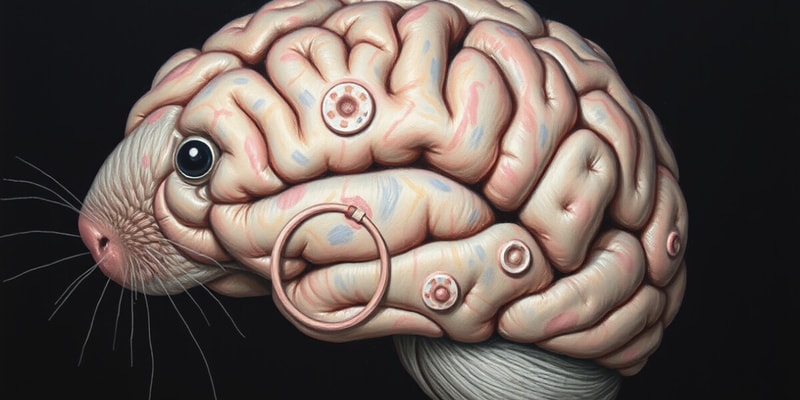Podcast
Questions and Answers
What term is used to describe a group of rats?
What term is used to describe a group of rats?
What is a primary characteristic of rats' diet?
What is a primary characteristic of rats' diet?
Which behavior is essential for maintaining rat dental health?
Which behavior is essential for maintaining rat dental health?
What is a common sign of illness in rats?
What is a common sign of illness in rats?
Signup and view all the answers
Which method do rats NOT use for communication?
Which method do rats NOT use for communication?
Signup and view all the answers
In what type of habitats are rats commonly found?
In what type of habitats are rats commonly found?
Signup and view all the answers
What type of behavior is observed in younger rats indicative of their social nature?
What type of behavior is observed in younger rats indicative of their social nature?
Signup and view all the answers
What is one of the most common diseases that rats are susceptible to?
What is one of the most common diseases that rats are susceptible to?
Signup and view all the answers
Study Notes
Rat Behavior
- Social Structure: Highly social animals; live in groups called mischiefs.
- Territoriality: Establish and defend territories; can be aggressive towards intruders.
- Learning Ability: Capable of complex problem-solving and learning through observation.
- Playfulness: Engage in play behavior, especially in younger rats; includes chasing and wrestling.
- Nocturnal Activity: Primarily active at night; exhibit various behaviors during the day when disturbed.
Rat Diet
- Omnivorous: Eat a variety of foods including fruits, vegetables, grains, and small insects.
- Dental Health: Continuously growing incisors; need to gnaw on hard objects to keep teeth healthy.
- Foraging Behavior: Forage for food and store it in burrows; often hoard food supplies.
- Nutritional Needs: Require a balanced diet with proteins, carbohydrates, fats, vitamins, and minerals.
Rat Health
- Common Diseases: Susceptible to respiratory infections, tumors, and parasites.
- Lifespan: Average lifespan is 2-3 years; health can be impacted by diet and living conditions.
- Signs of Illness: Symptoms include lethargy, weight loss, changes in appetite, and abnormal grooming.
- Preventive Care: Regular veterinary check-ups and clean living environments are crucial for health.
Rat Communication
- Vocalizations: Use squeaks, chirps, and other sounds to communicate; specific sounds convey different emotions.
- Body Language: Use posture and movements; tail positioning can indicate mood (e.g., flicking for agitation).
- Scent Marking: Utilize scent glands to mark territory and communicate with other rats.
- Ultrasonic Communication: Emit sounds beyond the range of human hearing, particularly during mating.
Rat Habitats
- Natural Habitat: Found in diverse environments including forests, grasslands, and urban areas.
- Burrowing: Construct extensive burrow systems for shelter, nesting, and food storage.
- Adaptability: Highly adaptable; can thrive in varied conditions, including human homes and sewers.
- Shelter: Prefer dark, enclosed spaces for safety; often seek out hidden areas to nest and raise young.
Rat Behavior
- Highly social animals that live in groups called mischiefs.
- Establish and defend territories; can exhibit aggression towards intruders.
- Possess strong learning abilities, capable of complex problem-solving and learning through observation.
- Young rats display playful behavior, engaging in activities like chasing and wrestling.
- Primarily nocturnal, actively foraging and exhibiting behaviors at night; may be disturbed during the day.
Rat Diet
- Omnivorous diet includes fruits, vegetables, grains, and small insects.
- Dental health relies on continual gnawing due to constantly growing incisors.
- Foraging behavior involves seeking food and storing it in burrows; often hoard food supplies for future use.
- Nutritional needs encompass a balanced intake of proteins, carbohydrates, fats, vitamins, and minerals.
Rat Health
- Common diseases include respiratory infections, tumors, and parasites.
- Average lifespan is 2-3 years; health is influenced by diet and living conditions.
- Signs of illness can include lethargy, weight loss, changes in appetite, and abnormal grooming behavior.
- Preventive care through regular veterinary check-ups and maintaining clean living environments is essential for good health.
Rat Communication
- Rely on a variety of vocalizations such as squeaks and chirps to express different emotions.
- Body language, including posture and tail positioning, is significant for indicating mood (e.g., tail flicking suggests agitation).
- Utilize scent glands for marking territory and communicating with other rats.
- Engage in ultrasonic communication, producing sounds that are inaudible to the human ear during mating.
Rat Habitats
- Inhabit diverse environments ranging from forests and grasslands to urban areas.
- Construct extensive burrow systems for shelter, nesting, and food storage.
- Highly adaptable creatures capable of thriving in various conditions, including human homes and sewers.
- Prefer dark, enclosed spaces for safety, seeking hidden areas to nest and raise their young.
Studying That Suits You
Use AI to generate personalized quizzes and flashcards to suit your learning preferences.
Description
Explore the fascinating social structure, dietary needs, and health concerns of rats in this comprehensive quiz. Learn about their nocturnal habits, playful interactions, and the importance of dental health in their diet. Perfect for animal lovers and enthusiasts!




